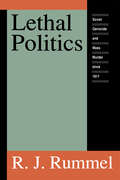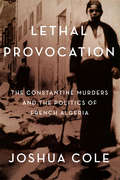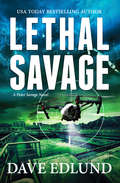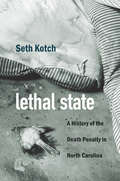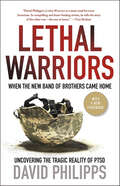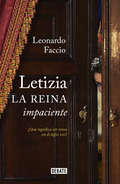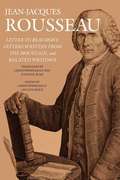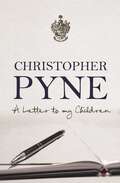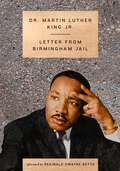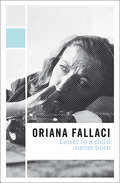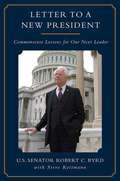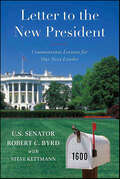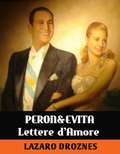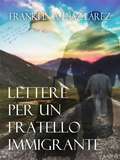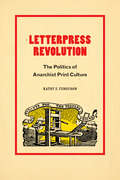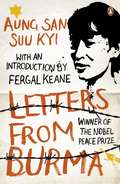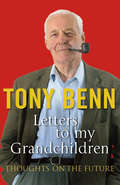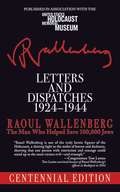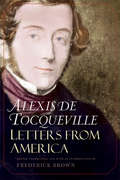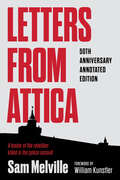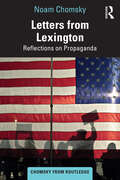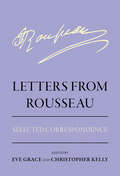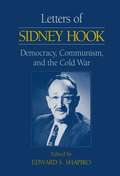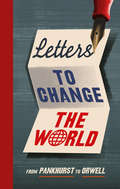- Table View
- List View
Lethal Politics: Soviet Genocide and Mass Murder Since 1917
by R. J. RummelWhile there are estimates of the number of people killed by Soviet authorities during particular episodes or campaigns, until now, no one has tried to calculate the complete human toll of Soviet genocides and mass murders since the revolution of 1917. Here, R. J. Rummel lists and analyzes hundreds of published estimates, presenting them in the historical context in which they occurred. His shocking conclusion is that, conservatively calculated, 61,911,000 people were systematically killed by the Communist regime from 1917 to 1987.Rummel divides the published estimates on which he bases his conclusions into eight historical periods, such as the Civil War, collectivization, and World War II. The estimates are further divided into agents of death, such as terrorism, deportations, and famine. Using statistical principles developed from more than 25 years of quantitative research on nations, he analyzes the estimates. In the collectivization period, for example, about 11,440,000 people were murdered. During World War II, while the Soviet Union had lost almost 20,000,000 in the war, the Party was killing even more of its citizens and foreigners-probably an additional 13,053,000. For each period, he defines, counts, and totals the sources of death. He shows that Soviet forced labor camps were the major engine of death, probably killing 39,464,000 prisoners overall.To give meaning and depth to these figures, Rummel compares them to the death toll from'major wars, world disasters, global genocide, deaths from cancer and other diseases, and the like. In these and other ways, Rummel goes well beyond the bare bones of statistical analysis and tries to provide understanding of this incredible toll of human lives. Why were these people killed? What was the political and social context? How can we understand it? These and other questions are addressed in a compelling historical narrative.This definitive book will be of interest to Soviet experts, those inte
Lethal Provocation: The Constantine Murders and the Politics of French Algeria
by Joshua ColePart murder mystery, part social history of political violence, Lethal Provocation is a forensic examination of the deadliest peacetime episode of anti-Jewish violence in modern French history. Joshua Cole reconstructs the 1934 riots in Constantine, Algeria, in which tensions between Muslims and Jews were aggravated by right-wing extremists, resulting in the deaths of twenty-eight people. Animating the unrest was Mohamed El Maadi, a soldier in the French army. Later a member of a notorious French nationalist group that threatened insurrection in the late 1930s, El Maadi became an enthusiastic supporter of France's Vichy regime in World War II, and finished his career in the German SS. Cole cracks the "cold case" of El Maadi's participation in the events, revealing both his presence at the scene and his motives in provoking violence at a moment when the French government was debating the rights of Muslims in Algeria. Local police and authorities came to know about the role of provocation in the unrest and killings and purposely hid the truth during the investigation that followed. Cole's sensitive history brings into high relief the cruelty of social relations in the decades before the war for Algerian independence.
Lethal Savage: A Peter Savage Novel (Peter Savage #6)
by Dave Edlund"I would follow Peter Savage into any firefight." -James Rollins, New York Times bestseller of The Demon CrownTwo men, one driven to the edge of sanity by heart-breaking losses, the other craving revenge, conspire to reshape America and bring her population to their knees.When young men on the Warm Springs Reservation in Central Oregon are stricken with an unidentified disease that leaves them sterile, Peter Savage is called to aid in the investigation.With the inquiry gaining momentum, Peter is kidnapped by hardened mercenaries. In the remote high desert of Oregon, Peter finds himself face to face with a demon from his past-an adversary who has seemingly risen from the grave.As the minutes count down to a biological holocaust, Peter presents the only chance to save an unwitting civilian population. With his trusted canine companion Diesel by his side, along with a former-assassin-turned-ally, Peter must gamble far more than his own life… and the odds have never been so long..Praise for Dave Edlund's Peter Savage Novels"I would follow Peter Savage into any firefight." -James Rollins,New York Times bestseller of The Demon Crown"Edlund is right at home with his bestselling brethren, Brad Thor and Brad Taylor." - Jon Land, USA Today bestselling author of the Caitlin Strong series"Required reading for any thriller aficionado" –Steve Berry, New York Times and #1 international bestselling author"Action on almost every page" -Foreword Reviews"Plenty of heart-racing action" -San Francisco Book ReviewRead the whole series!• Crossing Savage - Book 1• Relentless Savage - Book 2• Deadly Savage - Book 3• Hunting Savage - Book 4• Guarding Savage - Book 5• Lethal Savage - Book 6
Lethal State: A History of the Death Penalty in North Carolina (Justice, Power, and Politics)
by Seth KotchFor years, American states have tinkered with the machinery of death, seeking to align capital punishment with evolving social standards and public will. Against this backdrop, North Carolina had long stood out as a prolific executioner with harsh mandatory sentencing statutes. But as the state sought to remake its image as modern and business-progressive in the early twentieth century, the question of execution preoccupied lawmakers, reformers, and state boosters alike.In this book, Seth Kotch recounts the history of the death penalty in North Carolina from its colonial origins to the present. He tracks the attempts to reform and sanitize the administration of death in a state as dedicated to its image as it was to rigid racial hierarchies. Through this lens, Lethal State helps explain not only Americans' deep and growing uncertainty about the death penalty but also their commitment to it. Kotch argues that Jim Crow justice continued to reign in the guise of a modernizing, orderly state and offers essential insight into the relationship between race, violence, and power in North Carolina. The history of capital punishment in North Carolina, as in other states wrestling with similar issues, emerges as one of state-building through lethal punishment.
Lethal Warriors: When the New Band of Brothers Came Home
by David PhilippsPulitzer Prize finalist David Philipps brings to life the chilling story of how today's American heroes are slipping through the fingers of society—with multiple tours of duty and inadequate mental-health support creating a crisis of PTSD and a large-scale failure of veterans to reintegrate into society.Following the frightening narrative of the 506th Infantry Regiment—who had rebranded themselves as the Lethal Warriors after decades as the Band of Brothers—he reveals how the painful realities of war have multiplied in recent years, with tragic outcomes for America's soldiers, compounded by an indifferent government and a shrinking societal safety net.
Letizia. La reina impaciente: ¿Qué significa ser reina en el siglo XXI?
by Leonardo Faccio¿Qué significa ser reina en el siglo XXI? Este perfil biográfico presenta por primera vez a Letizia Ortiz con todas sus fortalezas y contradicciones: su búsqueda incesante de la perfección, el descontento perpetuo con sí misma, sus ansias de controlarlo todo, pero también su ímpetu, audacia y rebeldía. La vida de la mujer que en menos de diez años pasó de un bloque de apartamentos en Oviedo a ser presentadora de televisión en Madrid y que acabó siendo princesa y reina de España. Tras cinco años y más de cien entrevistas, Leonardo Faccio radiografía la personalidad de la reina, una periodista que renuncia a su profesión pero no a sus batallas personales para ser parte de una monarquía en crisis que quiere modernizarse para sobrevivir.
Letter To Beaumont, Letters Written From The Mountain, And Related Writings
by Jean-Jacques Rousseau Christopher Kelly Eve Grace Judith R. BushPublished between 1762 and 1765, these writings are the last works Rousseau wrote for publication during his lifetime. Responding in each to the censorship and burning of Emile and Social Contract, Rousseau airs his views on censorship, religion, and the relation between theory and practice in politics. <p><p> The Letter to Beaumont is a response to a Pastoral Letter by Christophe de Beaumont, Archbishop of Paris (also included in this volume), which attacks the religious teaching in Emile. Rousseau's response concerns the general theme of the relation between reason and revelation and contains his most explicit and boldest discussions of the Christian doctrines of creation, miracles, and original sin. <p> In Letters Written from the Mountain, a response to the political crisis in Rousseau's homeland of Geneva caused by a dispute over the burning of his works, Rousseau extends his discussion of Christianity and shows how the political principles of the Social Contract can be applied to a concrete constitutional crisis. One of his most important statements on the relation between political philosophy and political practice, it is accompanied by a fragmentary "History of the Government of Geneva." <p> Finally, "Vision of Peter of the Mountain, Called the Seer" is a humorous response to a resident of Motiers who had been inciting attacks on Rousseau during his exile there. Taking the form of a scriptural account of a vision, it is one of the rare examples of satire from Rousseau's pen and the only work he published anonymously after his decision in the early 1750s to put his name on all his published works. Within its satirical form, the "Vision" contains Rousseau's last public reflections on religious issues. <p> Neither the Letter to Beaumont nor the Letters Written from the Mountain has been translated into English since defective translations that appeared shortly after their appearance in French. These are the first translations of both the "History" and the "Vision."
Letter To My Children
by Christopher PyneWhy do seemingly intelligent men and women leave their families to spend more than half the year travelling to Canberra, and spending night after night at electorate and campaign events? Surely there are easier ways to earn a living. A Letter to My Children is Christopher Pyne's honest account of how a belief in the power of public service, inspired by his crusading ophthalmologist father, led him to pursue a career in politics, driven by the ambition of leaving a legacy for the next generation.
Letter from Birmingham Jail (The Essential Speeches of Dr. Martin Lut)
by Dr. Martin Luther King Jr.A beautiful commemorative edition of Dr. Martin Luther King's essay "Letter from Birmingham Jail,” part of Dr. King's archives published exclusively by HarperCollins.With an afterword by Reginald Dwayne Betts On April 16, 1923, Dr. Martin Luther King Jr., responded to an open letter written and published by eight white clergyman admonishing the civil rights demonstrations happening in Birmingham, Alabama. Dr. King drafted his seminal response on scraps of paper smuggled into jail. King criticizes his detractors for caring more about order than justice, defends nonviolent protests, and argues for the moral responsibility to obey just laws while disobeying unjust ones."Letter from Birmingham Jail" proclaims a message - confronting any injustice is an acceptable and righteous reason for civil disobedience.This beautifully designed edition presents Dr. King’s speech in its entirety, paying tribute to this extraordinary leader and his immeasurable contribution, and inspiring a new generation of activists dedicated to carrying on the fight for justice and equality.
Letter to a Child Never Born
by Oriana FallaciPublished by Rizzoli in 1975, Letter to a Child Never Born was quickly translated and sold in twenty-seven countries, becoming an extraordinary world success. It is the tragic monologue of a woman speaking with the child she carries in her womb. This letter confronts the burning theme of abortion, and the meaning of life, by asking difficult questions: Is it fair to impose life even if it means suffering? Would it be better not to be born at all? Letter to a Child Never Born touches on the real meaning of being a woman: the power to give life or not. When the book begins, the protagonist is upset after learning she is pregnant. She knows nothing about the child, except that this creature depends totally and uniquely on her own choices. The creation of another person directly within one's own body is a very shocking thing. The sense of responsibility is huge; it is a heavy burden that gives life to endless reflections, from the origin of our existence to the shame of our selfishness. If the child could choose, would he prefer to be born, to grow up, and to suffer, or would he return to the joyful limbo from which he came? A woman's freedom and individuality are also challenged by a newborn--should she renounce her freedom, her job, and her choice? What should she do at this point?
Letter to a New President: Commonsense Lessons for Our Next Leader
by Robert C. Byrd Steve Kettmann[From Jacket] "In 'Letter to a New President,' Byrd recounts lessons drawn from his remarkable life as a young boy growing up poor in the coalfields of southern West Virginia to his meteoric rise to the pinnacles of power in Washington, D.C. Byrd focuses his observations on underappreciated and seldom discussed virtues like personal responsibility, careful consideration before making decisions, and a sense of decency and fairness even toward fierce opponents. A student of history and a defender of our Constitution, Byrd looks to the past for lessons and, in 'Letter to a New President,' studies present failures as guides for constructive lessons for the future."
Letter to the New President: Commonsense Lessons for Our Next Leader
by Robert C. Byrd Steve KettmannA legendary Senator advises our next President on the commonsense values necessary to lead our nationUnited States Senator Robert C. Byrd is the longest-serving member of the United States Senate in the history of our great Republic. Senator Byrd has served the people of West Virginia, and the nation, for fifty-four years, and has served alongside eleven Presidents. He was twice elected by his colleagues to the position of Senate Majority Leader and currently is chairman of the powerful Senate Appropriations Committee. Byrd has lived through two world wars, the Great Depression, the civil rights movement, the Cold War, the resignation of a U.S. President, the 9/11 terrorist attacks, and traumatic military conflicts around the globe, including Iraq and Vietnam. Byrd has been a witness to it all. And now, in his ninetieth year of life, he wants to share the commonsense lessons he has learned from his unique vantage point in history.In Letter to a New President, Byrd recounts lessons drawn from his remarkable life as a young boy growing up poor in the coalfields of southern West Virginia to his meteoric rise to the pinnacles of power in Washington, D.C. From his unique vantage point in history, Byrd focuses his observations on underappreciated and seldom discussed virtues like personal responsibility, careful consideration before making decisions, and a sense of decency and fairness even toward fierce opponents. A student of history and a defender of our Constitution, Byrd looks to the past for lessons and, in Letter to a New President, studies present failures as guides for constructive lessons for the future.This book will help the next President grapple with the heavy demands of the office. Every American who cares about where this country is heading will find rich wisdom in Byrd's sage advice.Enlightened by a wide-ranging knowledge of American history and a love for the guiding principles of the Constitution, Byrd's observations sharpen the focus of the historical moment in which we find ourselves, as no one but Senator Byrd can.
Lettere D'amore Di Evita & Peron
by Lazaro DroznesPeron & Evita. Lettere d'amore: di Lázaro Droznes La straordinaria storia di Maria Eva Duarte de Peron nei suoi 33 anni di vita intensa è diventata un mito universale. Peron ed evitare. lettere d'amore: La traiettoria della vita di Maria Eva Duarte de Peron è una delle storie più straordinarie mai raccontate. Questo lavoro, sulla base di uno scambio epistolare apocrifa, getta uno sguardo alla esperienza soggettiva dei protagonisti di una delle storia d'amore più intenso che è stato l'Argentina. La morte di Evita è probabilmente dovuta al suo rifiuto di accettare qualsiasi trattamento medico. La sua frase "I dottori sono per i disoccupati, non per me. I trattamenti sono per gli oligarchi, per i quali non trabajan.¿No ti rendi conto che voglio inventare malattie di sabotare la mia gestione? "Esemplifica ciò che i greci chiamavano" hybris "-la malattia power-, che è l'ingrediente essenziale tutta la tragedia. In un periodo vitale di 33 anni, Evita è diventata un mito di portata universale. Questa drammatica fiction include le seguenti fasi della vita fantastica di Evita: parto naturale come la seconda famiglia di un proprietario terriero della provincia di Buenos Aires. Viaggio a 15 anni a Buenos Aires e solitudine nella grande città Sopravvivenza come cortigiana e attrice teatrale e radiofonica. Nascita e consegna di una figlia Matrimonio con il colonnello Perón. Moglie del Presidente e First Lady of the Nation. Viaggio in Europa. Trasformazione di Eva in Evita nel suo lavoro della Fondazione. Malattia, operazioni, menzogne e morte. Imbalsamazione del corpo di Evita. Scomparsa e ritorno del corpo imbalsamato. Reclami "post mortem" per le decisioni del vedovo nel suo terzo presidenza.
Lettere per un Fratello Immigrante
by Franklin A. Díaz LárezHai mai pensato di lasciare il tuo paese? Stai pensando di lasciarti tutto alle spalle per iniziare una nuova vita in un'altra parte del mondo Sai perfettamente ciò a cui vai incontro? Un testo scritto in forma di lettere destinate a un fratello che sogna di emigrare. Il fratello spiega i suoi dubbi, le sue incertezze e le sue perplessità, e l'autore gli risponde punto su punto in un linguaggio semplice, chiaro e trasparente, cercando di fargli prendere coscienza sia degli ostacoli e delle difficoltà che lo aspettano e sia delle molteplici opportunità che gli si presenteranno, e che lui, per via dell'emozione o semplicemente per non conoscenza dell'argomento, non è in grado di prevedere.
Letterpress Revolution: The Politics of Anarchist Print Culture
by Kathy E. FergusonWhile the stock image of the anarchist as a masked bomber or brick thrower prevails in the public eye, a more representative figure should be a printer at a printing press. In Letterpress Revolution, Kathy E. Ferguson explores the importance of printers, whose materials galvanized anarchist movements across the United States and Great Britain from the late nineteenth century to the 1940s. Ferguson shows how printers—whether working at presses in homes, offices, or community centers—arranged text, ink, images, graphic markers, and blank space within the architecture of the page. Printers' extensive correspondence with fellow anarchists and the radical ideas they published created dynamic and entangled networks that brought the decentralized anarchist movements together. Printers and presses did more than report on the movement; they were constitutive of it, and their vitality in anarchist communities helps explain anarchism’s remarkable persistence in the face of continuous harassment, arrest, assault, deportation, and exile. By inquiring into the political, material, and aesthetic practices of anarchist print culture, Ferguson points to possible methods for cultivating contemporary political resistance.
Letters From Burma
by Aung San Suu KyiLetters from Burma - an unforgettable collection from the Nobel Peace prize winner Aung San Suu KyiIn these astonishing letters, Aung San Suu Kyi reaches out beyond Burma's borders to paint for her readers a vivid and poignant picture of her native land.Here she celebrates the courageous army officers, academics, actors and everyday people who have supported the National League for Democracy, often at great risk to their own lives. She reveals the impact of political decisions on the people of Burma, from the terrible cost to the children of imprisoned dissidents - allowed to see their parents for only fifteen minutes every fortnight - to the effect of inflation on the national diet and of state repression on traditions of hospitality. She also evokes the beauty of the country's seasons and scenery, customs and festivities that remain so close to her heart.Through these remarkable letters, the reader catches a glimpse of exactly what is at stake as Suu Kyi fights on for freedom in Burma, and of the love for her homeland that sustains her non-violent battle.Includes an introduction from Fergal Keane'Aung San Suu Kyi has become a global symbol of peaceful resistance, courage and apparently endless endurance' Guardian'A real hero in an age of phony phone-in celebrity, which hands out that title freely to the most spoiled and underqualified' Bono, TimeAung San Suu Kyi is the leader of Burma's National League for Democracy. She was placed under house arrest in Rangoon in 1989, where she remained for almost 15 of the 21 years until her release in 2010, becoming one of the world's most prominent political prisoners. She is also the author of the collection of writings Freedom from Fear.
Letters My Mother Never Read: An Abandoned Child's Journey
by Jerri Diane SueckThe true story of Jerri, whose mother died when she was 8 and whose extended family wouldn't take care of her. Describes Jerri's time in foster care and a group home. Jerri eventually graduates from college and leads a successful life.
Letters To My Grandchildren: Lessons For The Future
by Tony BennAs a diarist I have chronicled the time through which I have lived in meticulous detail: but all that is history. What matters now is the future for those who will live through it.The past is the past but there may be lessons to be learned which could help the next generation to avoid mistakes their parents and grandparents made.Certainly at my age I have learned an enormous amount from the study of history - not so much from the political leaders of the time but from those who struggled for justice and explained the world in a way that shows the continuity of history and has inspired me to do my work.Normality for any individual is what the world is like on the day they are born. The normality of the young is wholly different from the normality of their grandparents.It is the disentangling of the real questions from the day to day business of politics that may make sense for those who take up the task as they will do.Every generation has to fight the same battles as their ancestors had to fight, again and again, for there is no final victory and no final defeat. Two flames have burned from the beginning of time - the flame of anger against injustice and the flame of hope. If this book serves its purpose it will fan both flames.
Letters and Dispatches 1924-1944: The Man Who Saved Over 100,000 Jews, Centennial Edition
by Raoul WallenbergThe best way to hear the story of Raoul Wallenberg is through his own words. Put together from three different collections, Letters and Dispatches is the most thorough book of Wallenberg's writings and letters. With his disappearance behind the Iron Curtain in January of 1945, he became tragically mysterious. While the story of Wallenberg has been told many times over, the best way we can possibly understand and relate to him is through his written word, which Letters and Dispatches has in full.
Letters from America: Alexis de Tocqueville
by Alexis De Tocqueville Frederick BrownYoung Alexis de Tocqueville arrived in the United States for the first time in May 1831, commissioned by the French government to study the American prison system. For the next nine months he and his companion, Gustave de Beaumont, traveled and observed not only prisons but also the political, economic, and social systems of the early republic. Along the way, they frequently reported back to friends and family members in France. This book presents the first translation of the complete letters Tocqueville wrote during that seminal journey, accompanied by excerpts from Beaumont’s correspondence that provide details or different perspectives on the places, people, and American life and attitudes the travelers encountered. These delightful letters provide an intimate portrait of the complicated, talented Tocqueville, who opened himself without prejudice to the world of Jacksonian America. Moreover, they contain many of the impressions and ideas that served as preliminary sketches for Democracy in America, his classic account of the American democratic system that remains an important reference work to this day. Accessible, witty, and charming, the letters Tocqueville penned while in America are of major interest to general readers, scholars, and students alike.
Letters from Attica: 50th Anniversary Annotated Edition
by Joshua Melville Sam MelvilleNow presented with a son's thirty years of research to provide new context. In June 1970, Sam Melville pleaded guilty to a series of politically motivated bombings in New York City and was sentenced to thirteen to eighteen years in jail. His imprisonment took him to Attica, where he helped lead the massive rebellion of September 9, 1971—and where, four days later, he was shot to death by state police. During nearly two years in prison, Melville wrote letters to his friends, his attorneys, his former wife, and his young son. To read them is to eavesdrop on a man's soul. Determinedly honest and deeply moving, they reveal much about Sam and evoke the suffering of prisoners in America. Collected after his death, the letters were originally published with material by Jane Alpert, who was living with Sam when both were arrested on bombing charges, and John Cohen, a close friend who visited Sam in jail. Sam's letters begin with despair but end in hope and defiance. He became a leader of the prisoners' struggle for justice and humane treatment. At Attica he fought against and was a victim of the state's brutality. Those who knew Sam found him a man of extraordinary courage and determination, who rather than accede or submit to injustice and racism chose to fight against them.
Letters from Lexington: Reflections on Propaganda (Chomsky from Routledge)
by Noam ChomskyUpon its original publication in 1993, Letters from Lexington reaffirmed Noam Chomsky's status as one of the most incisive critics of the American media. Reissued with a new foreword by Chomsky’s long-term collaborator, radio broadcaster David Barsamian, this prescient book remains startlingly relevant in our current age of disinformation and “fake news.”Throughout the book, Chomsky critiques the media’s complicity in US domestic and foreign policy. In particular, Chomsky's analyses of the politics of the Reagan and earlier Bush administrations offer illuminating perspectives on the events, key players, and policies that would continue to shape America's national agenda during the presidency of George W. Bush and the “War on Terrorism.”Letters from Lexington remains an indispensable guide to the American propaganda machine and the shibboleths of the mainstream media. As such, this book will appeal to students and scholars with an interest in the media and US domestic and foreign policy, as well as serve as a vital tool for activists and general readers seeking to question dubious narratives put forward by the mainstream media.
Letters from Rousseau: Selected Correspondence (Agora Editions)
by Eve Grace Christopher KellyLetters from Rousseau is the first extensive collection of translations of Rousseau's correspondence into English in more than eighty years. Many of the letters have not been translated before, while others address substantive issues in his thought and complement his published writings. Although these letters went through the post as ordinary letters, once Rousseau became famous, he knew that they might be opened by the police and that they were very likely to be circulated and even published. Indeed, he wrote some of them with a view to their ultimate publication.Rousseau's enormous "private" correspondence extends into all periods of his life, including intimate letters to friends, letters to famous individuals, and responses to readers who posed philosophic questions to him. Thus, Eve Grace and Christopher Kelly also share his responses to readers who had been moved by his books. Further, this volume includes letters written to or about major intellectual figures, such as Diderot, Voltaire, Hume, and Mirabeau.
Letters of Sidney Hook: Democracy, Communism and the Cold War
by Edward S. Shapiro Sidney HookSidney Hook (1902-1989) is known for his participation in the public debates about communism, the Soviet Union and the Cold War. These letters, drawn from the Hook collection at the Hoover Institution, provide an insight into US intellectual and political history.
Letters to Change the World: From Emmeline Pankhurst to Martin Luther King, Jr.
by Travis Elborough‘We know through painful experience that freedom is never voluntarily given by the oppressor; it must be demanded by the oppressed’ Martin Luther KingIn an era where the liberties we often take for granted are under threat, Letters To Change the World is a collection of inspiring letters offering reminders from history that standing up for and voicing our personal and political beliefs is not merely a crucial right but a duty if we want to change the world.Edited by Travis Elborough, the collection includes George Orwell's warning on totalitarianism, Martin Luther King's 'Letter from a Birmingham Jail', Albert Camus on the reasons to fight a war, Bertrand Russell on peace, Emmeline Pankhurst rallying her suffragettes, Nelson Mandela's letter to his children from prison and Time's Up on the abuse of power.
